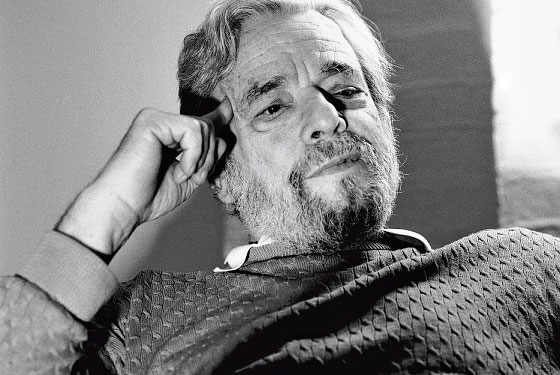
“I think most mortals would have abandoned this,” says Stephen Sondheim. It’s early August, and his long-aborning musical about the Mizner brothers has just picked up a new title, Road Show. That name replaced Bounce, which replaced Wise Guys, after a brief flirtation with Gold! By the time it opens in November at the Public, it will have played in four versions in three cities for as many directors. At several junctures—during, say, the now-settled lawsuit with former backer Scott Rudin—Sondheim and John Weidman’s musical seemed to be taking a mimetic approach to the calamitous, boom-and-bust story of the architect Addison Mizner and his fast-talking brother Wilson. Yet Sondheim has remained about as steadfast as you’d imagine for the man who wrote “I’m Still Here.” “I consider this whole thing a very long out-of-town tryout,” he says, smiling on a couch in his East Side townhouse. “That’s really what it is.”
The immediate origins of the project (if not so immediate as they once were) lie in Sondheim’s casting about for a Weidman collaboration after their dark drama Assassins in the early nineties. On the Mizners, as on presidential killers, they saw eye-to-eye. “The tone was the Road pictures,” says Sondheim, referring to the freewheeling Hope-and-Crosby comedies, “except with about 35 years of American history, from the Gold Rush to their deaths in the early 1930s.” Trouble was, the co-authors couldn’t figure out how to tell the picaresque tale, and neither could the various directors who joined them over the years. Sam Mendes made it “much less goofy,” he says. Hal Prince suggested a leading lady, “which sounded like a good idea at the time.”
At the Public, in the hands of some accomplished recent interpreters of Sondheim’s work (director John Doyle, stars Michael Cerveris and Alexander Gemignani), a lot of what’s going on is restoration. Some old songs have been reinstated, and Wilson’s girlfriend has been removed—but not Addison’s lover, making them the first openly gay characters in a Sondheim show, a piece of trivia that seems to interest their creator not at all. Mainly, Sondheim says, he and Weidman want to recapture “the swift, light musical comedy feeling” of the show’s early drafts.
As it happens, that is precisely the feeling that puzzled so many of the show’s out-of-town critics. What in the world, they wanted to know, could have made the dark lord of the modern musical take a sudden interest in a buddy comedy about Palm Beach? In fact, the interest couldn’t have been less sudden. “I’ve wanted to do this since I was 22 years old,” says Sondheim. He saved up money from his first job after college to secure the rights to Alva Johnston’s book about the Mizners, only to discover that David Merrick had beaten him to it.
Considering all the agita this idea has caused him since then, you have to wonder: Why does he bother? Sondheim has had a glowing late-life surge over the last few years, a string of lavishly praised revivals culminating in a Major Motion Picture of Sweeney Todd. (Pressed for an explanation for his latter-day popularity, he offers, “I do believe—and it sounds immodest—that certain stuff improves when you listen to it more than once. That’s all.”) Plus, there’s more Sondheim on the way, most prominently a Broadway revival of West Side Story that will feature Spanish-language dialogue and lyrics. (“West Side olé olé,” he says drily, when I bring it up. He thinks it’s “a great idea,” and says Lin-Manuel Miranda, of In the Heights, is in line to translate his lyrics.) Most trying of all, though, is his sense that his energy for work is diminishing, and the expectations borne of his living-legend status, even for a little show like this one, make him “more hesitant and more frightened and more reluctant” to write.
Under the circumstances, nobody would blame a 78-year-old who has achieved so much if he decided to retire to the countryside and spend more time with the dogs, a pair of rambunctious poodles named—wait for it—Willy and Addy. But the answer to Sondheim’s working troubles, like the answer to those of Addison Mizner, or the Seurat of Sunday in the Park With George, seems to be Keep working. He’s already “nibbling at” something new with Weidman, though he refuses to divulge details. When he’s working, he says, the excitement still comes. “It’s finishing the hat. You get completely entranced. The world disappears and you’re with your own imagination, and it’s really fun,” he says. “Starting the hat is hard. Finishing the hat is fun.”
Road Show
By Stephen Sondheim and John Weidman.
Public Theater; in previews October 28 for an November 18 opening.